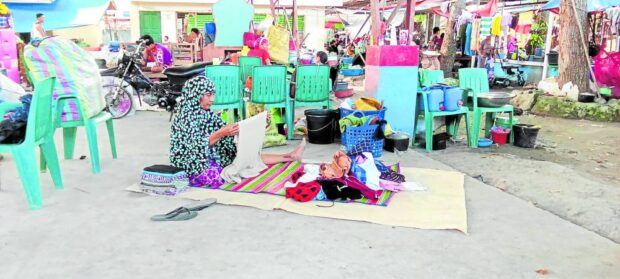
DISPLACED Evacuees from Datu Saudi-Ampatuan, Maguindanao del Sur, seek shelter in an elementary school in Barangay Dapiawan to escape recent clashes sparked by infighting among former Moro Islamic Liberation Front guerrillas. —PHOTO COURTESY OF RAPID EMERGENCY ACTION ON DISASTER INCIDENCE-BARMM
GENERAL SANTOS CITY—Global think tank International Crisis Group has called on the government and the Moro Islamic Liberation Front (MILF), which currently leads the interim Bangsamoro government, to hasten implementation of the milestones defined in the landmark 2014 peace deal they signed, especially the dismantling of private armed groups (PAGs) of local political elites.
In a 46-page report titled “Southern Philippines: Making Peace Stick in the Bangsamoro” released on Monday, Crisis Group noted that “with only two years before the 2025 election season kicks off, time is running out to achieve the peace deal’s goals.”
“The paramount goals are for national and regional authorities to defuse local conflicts, ensure that MILF rebels continue to hand in their weapons, support their full transition to civilian life and disarm the ubiquitous clan militias,” Crisis Group said.
“The closer authorities get to these objectives, the smoother the path will be toward the 2025 parliamentary elections, and successful completion of the decadeslong effort to bring peace and autonomy to the Bangsamoro,” it added.
The Bangsamoro Autonomous Region in Muslim Mindanao (BARMM) will hold its first parliamentary elections in 2025, simultaneous with the national and local elections. It was supposed to be held in May 2022, but was rescheduled by then President Rodrigo Duterte when he signed into law Republic Act No. 11593.
The postponement effectively extended the life of the Bangsamoro Transition Authority (BTA) for another three years, up to mid-2025. The BTA is the interim government of the Bangsamoro region, which was created in 2019 following the ratification of RA 11054 or the Organic Law for the BARMM.
“For lasting peace to take hold, national and interim regional authorities must quell violent instability and speed up elements of the peace process that are behind schedule,” said Georgi Engelbrecht, Crisis Group’s senior analyst and author of the report.
In its report, Crisis Group said that a successful Bangsamoro peace process “would of course be most keenly felt in the region, but its symbolism would likely resonate beyond the Philippines, given the extent to which the Bangsamoro has become an example of a negotiated, democratic approach to addressing long-term conflict.”
“A model for what can be achieved through an inclusive and democratic effort to resolve a longstanding conflict, the Bangsamoro deal must not be allowed to fail—both for those who benefit from it, and those who stand to emulate it,” Engelbrecht said.
Threats
He pointed out that at present, threats to the Bangsamoro peace process are coming from within the region such as community disputes, clan feuds and intra-MILF clashes, which should not be overlooked.
Last week, more than 3,000 families fled Datu Saudi-Ampatuan town in Maguindanao del Sur as supporters of warring former MILF commanders clashed over a long-standing dispute, an incident that has been regularly recurring.
Under the administration of President Marcos, Crisis Group noted that the Bangsamoro peace process, despite many obstacles, was progressing—and facing perils as well.